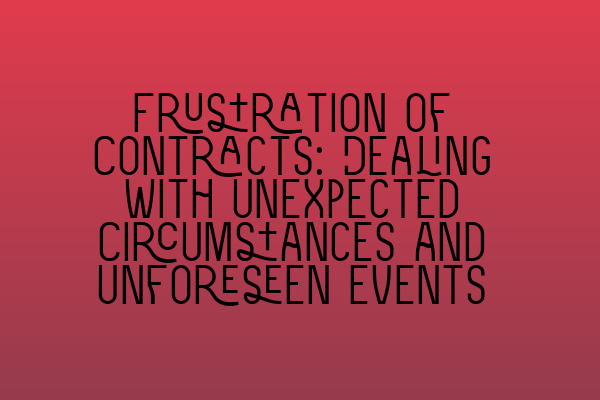Frustration of Contracts: Dealing with Unexpected Circumstances and Unforeseen Events
Contracts form the backbone of business transactions and legal agreements. They establish the rights and obligations of parties involved, providing a framework for their relationships. However, what happens when unforeseen circumstances or unexpected events render the performance of a contract impossible or radically different from what was originally intended? In such cases, the doctrine of frustration comes into play. This blog post will delve into the concept of frustration of contracts, exploring its definition, application, and consequences in contract law.
Understanding Frustration of Contracts
Frustration occurs when an unforeseen event or change in circumstances renders the contract impossible to perform, or radically transforms the contractual obligations. This doctrine recognizes that parties should not be held responsible for events beyond their control, which make the contract fundamentally different from what was initially agreed upon.
However, it is important to note that not all unexpected or difficult situations will result in frustration. To successfully argue frustration, the following conditions must be met:
- The event or change in circumstances was unforeseeable.
- The event or change in circumstances was beyond the control of the parties.
- The event or change in circumstances renders the contract impossible to perform or radically transforms the contractual obligations.
- The parties did not assume the risk of the event or change in circumstances in the contract.
If these conditions are satisfied, frustration can be invoked, leading to the discharge of the contract and relieving the parties from their obligations.
Examples of Frustration
Let’s explore some examples to illustrate the application of frustration in contract law:
1. Destruction of Subject Matter: Imagine a contract where Party A agrees to sell a rare collector’s item to Party B. However, before Party A can deliver the item, it is destroyed due to a fire. In this scenario, frustration can be invoked as the subject matter of the contract no longer exists, making performance impossible.
2. Government Restrictions: Consider a contract where Party A agrees to host a large gathering at a venue controlled by Party B. Due to unforeseen government regulations limiting public gatherings, the event cannot take place. Frustration can be invoked here as the change in government restrictions has rendered the performance of the contract impossible.
3. Personal Incapacity: In some cases, personal incapacity may lead to frustration. For example, if an artist contracts with a gallery to create a series of paintings but becomes seriously ill and unable to paint, frustration can be invoked as the performance of the contract becomes impossible due to the artist’s incapacity.
Consequences of Frustration
When frustration is successfully invoked, the contract is discharged, meaning that the parties are no longer bound by its terms. Consequently, both parties are released from their obligations, and any payments or benefits received must be returned. However, the law seeks to ensure fairness and prevent unjust enrichment. Therefore, any expenses incurred or benefits received before the frustrating event occurred may be recoverable.
It is worth noting that frustration does not result in damages being awarded to the parties. Unlike a breach of contract, frustration does not hold the defaulting party liable for any losses suffered by the non-defaulting party.
The Importance of Drafting Contracts Carefully
Given the potential enforceability concerns associated with frustration, it is crucial to consider unforeseen events and risk allocation when drafting contracts. Parties should clearly define the scope of unforeseen events that will trigger frustration, as well as any assumptions of risk. This can be achieved through well-drafted force majeure clauses, which allocate the risks and responsibilities between the parties in case of unexpected events.
To better understand the interpretation and drafting of contractual clauses, you may find our related article on “Interpreting Contractual Clauses: Unlocking the Hidden Meanings” helpful.
In Conclusion
Frustration of contracts provides a legal remedy for unforeseen events or change in circumstances that render the performance of a contract impossible or radically different. By understanding the concept of frustration, its application, and the consequences it entails, parties can protect themselves and seek appropriate redress when faced with unexpected situations.
For a deeper understanding of contract law and its various aspects, we recommend exploring our related articles:
- Agreements in Contract Law: Understanding Its Various Types
- Essentials of Consideration: Understanding the Basis of Contractual Exchange
- Contract Law Tutorials: Simplifying Complex Concepts for Students
- Discharge of Contracts: Modes and Consequences Explained
By staying informed and seeking legal advice when necessary, parties can navigate the complexities of contract law and safeguard their interests.
